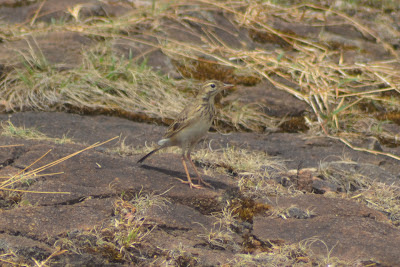Pipits are quite difficult to classify, and becomes much complicated during migratory season. It needs lots of scrutiny and experience to correctly classify a Pipit. They are found throughout India and as the name suggests Paddyfield Pipits are seen in plains, grasslands and fields with low crop cultivations. They fly with a weak plaintive call when disturbed before settling, rarely arboreal. When disturbed from nest the female flutters along the ground as if wounded, a habit that is common to most Pipits.
Frank Collymore: the Caribbean spring
Frank Collymore: the Caribbean spring
 I was searching for someone I could write about and came across Frank Collymore (1893–1980), an amazing man. He was well-known author, poet, acclaimed Barbadian man of letters, stage performer and painter, but importantly played a significant role in launching the careers of Derek Walcott, Kamau Brathwaite, George Lamming, Austin Clarke, and Edgar Mittelholzer (to name a few) through Bim and "Caribbean Voices". His influence has even shaped modern Caribbean letters. To know that he never went to university was quite a revelation. Collymore was school teacher and retired as deputy headmaster, he spent sixty years at the same school! His influence on generations of boys was profound, and played an important part in making Combermere one of the leading schools in Barbados, a position it continues to enjoy to this day.
I was searching for someone I could write about and came across Frank Collymore (1893–1980), an amazing man. He was well-known author, poet, acclaimed Barbadian man of letters, stage performer and painter, but importantly played a significant role in launching the careers of Derek Walcott, Kamau Brathwaite, George Lamming, Austin Clarke, and Edgar Mittelholzer (to name a few) through Bim and "Caribbean Voices". His influence has even shaped modern Caribbean letters. To know that he never went to university was quite a revelation. Collymore was school teacher and retired as deputy headmaster, he spent sixty years at the same school! His influence on generations of boys was profound, and played an important part in making Combermere one of the leading schools in Barbados, a position it continues to enjoy to this day.Collymore’s influence was far-reaching in a number of ways. He published several volumes of poetry and a number of short stories, most of which were posthumously collected in The Man Who Loved Attending Funerals (1993). As a lover of literature, he was also a dedicated and selfless encourager of the work of others, lending books to aspiring writers from their schooldays onwards, publishing their early work in Bim, the literary magazine he edited for more than fifty issues from the 1940s to the 1970s.
I did search for his poems in the Net but surprisingly couldn't find much except this one…
Days End
Sometimes when the day is ended
And the duties of day are done
I'll watch at the western window.
The glow of the setting sun
When the day is vexed with trials
And I cannot see my way through
Then I think of that "Beautiful City"
That lieth not far from view
Then I think of the beauties of Heaven
What splendor I there shall behold
When I reach the portals of heaven
And view the City of Gold
There will fall on my restless spirit
A calm, oh so wonderful sweet
And I shall cross over the river
To rest at my Savior's feet.
Sometimes when the day is ended
And the duties of day are done
I'll watch at the western window.
The glow of the setting sun
When the day is vexed with trials
And I cannot see my way through
Then I think of that "Beautiful City"
That lieth not far from view
Then I think of the beauties of Heaven
What splendor I there shall behold
When I reach the portals of heaven
And view the City of Gold
There will fall on my restless spirit
A calm, oh so wonderful sweet
And I shall cross over the river
To rest at my Savior's feet.
Aftermath of violence
Someone will rummage through the charred belongings
Someone will search for her missing toy
Someone is holding on to the tenuous thread of sanity
Someone will henceforth live in memories
Someone will not trust
Someone lost the reason to speak
Someone will not dream
Fighting gods
(an autorickshaw driver at Thrissur)
Pendants hung from the rear mirror
one had Hunuman in flight with miniature mountain on a hand,
the other a Cross, another a minaret.
It had got entangled, i pointed this to him.
‘Yes these gods have problem. They fight with each other!!’





















